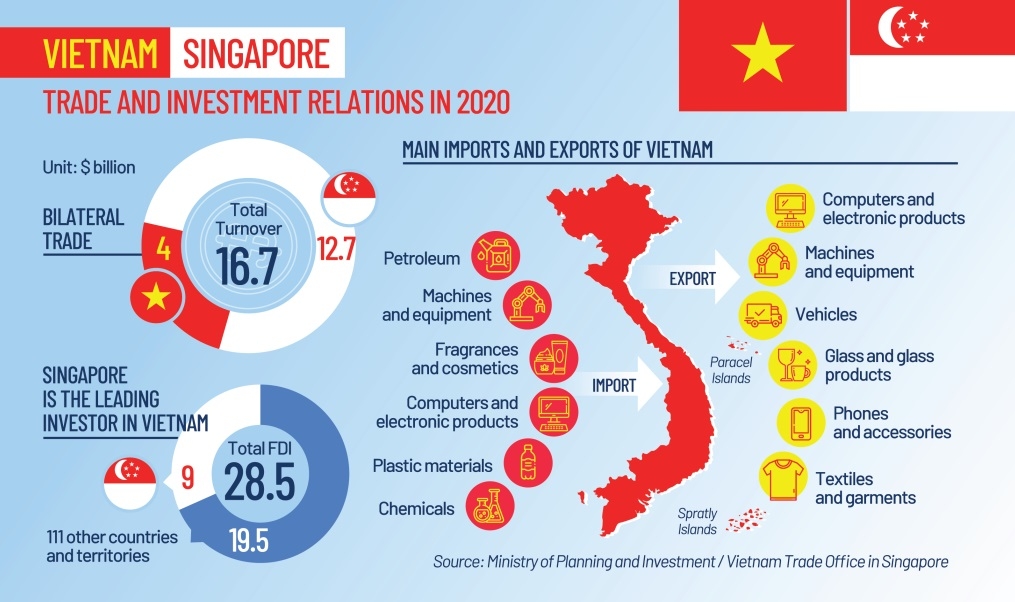Like-minded nations striving to pursue global integration
 |
| Singaporean Ambassador to Vietnam Jaya Ratnam |
Singapore and Vietnam share a close and longstanding partnership, rooted in our close political ties and many shared interests. Our extensive cooperation bilaterally and in multilateral forums is mutually reinforcing. This can be clearly seen in our economic ties – a key pillar of our relationship.
Bilateral trade has grown steadily over the past decade, reaching S$22.7 billion ($16.7 billion) in 2020. This was even amidst the disruptions to global trade caused by the COVID-19 pandemic. In addition, Singapore became the largest source of foreign direct investment into Vietnam for 2020 and the first half of 2021. This is a strong testament to the confidence our companies have in Vietnam’s future.
Our robust relationship was not built overnight. Singapore has been a close partner of Vietnam for several decades. This year, we celebrate the 25th anniversary of the establishment of the first Vietnam-Singapore Industrial Park (VSIP) in the southern province of Binh Duong. Today, there are VSIPs in over seven different locations in this country. In total, they have attracted $14 billion in investments and created over 270,000 jobs in Vietnam.
The VSIPs are a physical manifestation of the close economic relationship between our two countries. Looking ahead, the presence of VSIPs will continue to expand across Vietnam, and I am confident they will make substantial contributions to our bilateral ties.
Both countries are adapting our economic cooperation in line with our evolving interests and needs. The Singapore-Vietnam Connectivity Framework Agreement, which was established in 2006, covers six sectors: education and training, finance, IT and telecommunications, investment, trade and services, and transportation.
 |
While most of these sectors remain relevant, we have been working to refresh our partnership. We have leveraged the annual Connectivity Ministerial Meetings, led by Vietnam’s minister of planning and investment and Singapore’s minister for trade and industry, to exchange views on current economic issues and update each other on our new priorities and areas of interest.
At the most recent 14th Connectivity Ministerial Meeting in 2019, both countries agreed to expand some sectors of the Connectivity Framework to include innovation, technology, and startups. We look forward to advancing these conversations and continuing to explore potential new areas of collaboration at the 15th Connectivity Ministerial Meeting later this year.
Indeed, there are good reasons to be optimistic about our future bilateral economic ties. Even as we face the challenges brought about by COVID-19 and rapid technological change, new prospects have emerged. For example, in the education sector, school closures have pushed education providers to adopt e-learning solutions. This has created an emerging market for edtech solutions. There are also increasing opportunities for collaboration on e-commerce and e-payments.
Many enterprises and consumers have pivoted to online shopping and contactless transactions due to the impact of COVID-19 on traditional ways of doing business. In turn, this has opened up the digital domain for companies of all sizes to provide better and more seamless online services, both within countries and crucially across borders. There are also openings for Singapore and Vietnamese businesses to capitalise on supporting industries for e-commerce, for example in logistics solutions.
In addition, both countries are driving digitalisation in smart cities, Industry 4.0, e-government, cybersecurity, AI, and cloud technologies. As the economic landscape shifts, there remains much potential for Singapore and Vietnam to further expand and deepen our trade and investment ties.
Vietnam and Singapore’s governments are exploring ways to facilitate this emerging cooperation. We have agreed to establish two bilateral working groups – an initiative announced during Singaporean Minister for Foreign Affairs Dr. Vivian Balakrishnan’s official visit to Vietnam in June this year. The working group on COVID-19 cooperation will aim to facilitate both countries’ recovery from the pandemic. This will be done by putting in place regulatory systems to ensure that when the time is right, safe travel between both countries for official and business purposes can resume.
Meanwhile, the working group on digital economy cooperation will explore how both countries can align our regulations to facilitate digital trade and commerce, and work together on new and emerging technologies. We look forward to working closely with the Vietnamese government on these important issues.
Our bilateral economic ties are reinforced by the fact that Singapore and Vietnam are like-minded on the need to pursue greater regional and international economic integration. For instance, we have worked closely within ASEAN to promote the ASEAN Economic Community, including during Vietnam’s ASEAN Chairmanship in 2020.
Both countries are strong supporters of next-generation free trade agreements (FTAs) such as the Comprehensive and Progressive Agreement for Trans-Pacific Partnership, and we are also the only two ASEAN countries that have such an FTA with the European Union. In addition, after many years of painstaking negotiations, the Regional Comprehensive Economic Partnership was signed under Vietnam’s ASEAN chairmanship last year.
This clearly demonstrates Vietnam’s commitment to promoting greater regional economic integration – a commitment that Singapore shares. Both our countries also actively cooperate within key multilateral groupings like the Asia-Pacific Economic Cooperation platform and the World Trade Organization.
As countries navigating an increasingly complex global environment, both Singapore and Vietnam recognise the value of greater economic integration. We share the understanding that this will help to attract more high-value investments into the region, build resilience against external shocks, and help our businesses to capitalise on a larger and more diverse market. For Singapore, this recognition is ultimately founded on a belief that when Vietnam and ASEAN prosper, Singapore prospers.
During this difficult time, when countries around the world are grappling with the effects of the pandemic, international integration is more important than ever. Free trade and efficient supply chains are crucial to saving both lives and livelihoods. A multilateral rules-based order remains essential for countries to advance their common interests.
Singapore and Vietnam have a strong track record of building and strengthening economic links, both bilaterally and multilaterally. I am confident that both sides will continue to do so in the future.
What the stars mean:
★ Poor ★ ★ Promising ★★★ Good ★★★★ Very good ★★★★★ Exceptional
 Tag:
Tag:
Related Contents
Latest News
More News
- NAB Innovation Centre underscores Vietnam’s appeal for tech investment (January 30, 2026 | 11:16)
- Vietnam moves towards market-based fuel management with E10 rollout (January 30, 2026 | 11:10)
- Vietnam startup funding enters a period of capital reset (January 30, 2026 | 11:06)
- Vietnam strengthens public debt management with World Bank and IMF (January 30, 2026 | 11:00)
- PM inspects APEC 2027 project progress in An Giang province (January 29, 2026 | 09:00)
- Vietnam among the world’s top 15 trading nations (January 28, 2026 | 17:12)
- Vietnam accelerates preparations for arbitration centre linked to new financial hub (January 28, 2026 | 17:09)
- Vietnam's IPO market on recovery trajectory (January 28, 2026 | 17:04)
- Digital economy takes centre stage in Vietnam’s new growth model (January 28, 2026 | 11:43)
- EU Council president to visit Vietnam amid partnership upgrade (January 28, 2026 | 11:00)






















 Mobile Version
Mobile Version